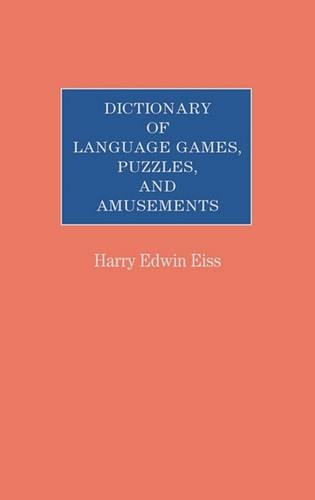
Dictionary of Language Games, Puzzles, and Amusements
(Hardback)
Publishing Details
Dictionary of Language Games, Puzzles, and Amusements
By (Author) Harry E. Eiss
Bloomsbury Publishing PLC
Greenwood Press
21st October 1986
United States
Classifications
General
Non Fiction
793.73
Physical Properties
Hardback
295
Description
Throughout recorded history, mankind has turned to language play as a source of entertainment and intellectual stimulation. This unique new reference provides comprehensive listings and explainations, together with samples and historical information, concerning the hundreds of letter and word games, puzzles, and linguistic entertainments that enrich our cultural life. In an introductory section, the author discusses the various ways of manipulating words and letters and the relation of this pastime to literature, linguistics, education and humor. He comments on the use of word-play techniques in the teaching of language arts, noting their demonstrated benefits in stimulating creativity and motivating the unwilling student. Turning to the literary uses of language play, he talks about writers--from Shakespeare, Dickens, James Joyce, and Gertrude Stein to the dadaists, Edward Lear, Ogden Nash, and various contemporary literary artists--whose linguistic devices run the gamut from riddles, acrostics, cross-word puzzles, and anagrams--are considered, along with individual and group games intended to entertain, teach skills, or challenge the imagination or intellect.
Reviews
The dictionary contains some 350 intriguing descriptions of word play and word games, such as conundrum, ' spoonerism, ' hangman, ' and stinky pinky.' Entries are arranged alphabetically and include a brief bibliography and references to similar games. There are also some 200 see' references, a brief index, and two general bibliographies that cover collections of word games and puzzles, and reference works for analyzing and playing' word games and puzzles. While the author makes no claims to comprehensiveness, the dictionary includes most of the best-known word games. An excellent reference work, worthy of consideration by libraries with an interest in the subject....-Choice
This is a very complete and detailed listing, with definitions, explanations, and examples of hundreds of word games, puzzles, and amusements is the English language. Mathematical games and puzzles are not included, and except for a few jumbled-language games where some Latin is used, English in employed throughout. Typical games covered are anagrams, alliteration, car games (making up words from car license plates), charades, guessing games, limericks, palindromes, rebuses, Scrabble, and the like. Entries vary in length, but usually give a definition, origin of the name if known, explanation of the game or the rules of play, a few examples if appropriate, usually some reference to similar games or puzzles, and finally a bibliography relating to that particular game. Black and white line drawings are used when necessary to make the entry clear. There is a more extensive bibliography of books relating to the topic in general at the end of the work, and it concludes with a brief index. ... The reference value of this work is obvious in that it defines, in most cases adequately, many elusive game terms, such as guggenheim, hangman, or lipogram, not usually found in dictionaries. It will also provide ideas for children's and adult recreational situations, and so will be useful for teachers and planners of intellectual and recreational activities for people of all ages.-Reference Books Bulletin
"The dictionary contains some 350 intriguing descriptions of word play and word games, such as conundrum, ' spoonerism, ' hangman, ' and stinky pinky.' Entries are arranged alphabetically and include a brief bibliography and references to similar games. There are also some 200 see' references, a brief index, and two general bibliographies that cover collections of word games and puzzles, and reference works for analyzing and playing' word games and puzzles. While the author makes no claims to comprehensiveness, the dictionary includes most of the best-known word games. An excellent reference work, worthy of consideration by libraries with an interest in the subject...."-Choice
"This is a very complete and detailed listing, with definitions, explanations, and examples of hundreds of word games, puzzles, and amusements is the English language. Mathematical games and puzzles are not included, and except for a few jumbled-language games where some Latin is used, English in employed throughout. Typical games covered are anagrams, alliteration, car games (making up words from car license plates), charades, guessing games, limericks, palindromes, rebuses, Scrabble, and the like. Entries vary in length, but usually give a definition, origin of the name if known, explanation of the game or the rules of play, a few examples if appropriate, usually some reference to similar games or puzzles, and finally a bibliography relating to that particular game. Black and white line drawings are used when necessary to make the entry clear. There is a more extensive bibliography of books relating to the topic in general at the end of the work, and it concludes with a brief index. ... The reference value of this work is obvious in that it defines, in most cases adequately, many elusive game terms, such as guggenheim, hangman, or lipogram, not usually found in dictionaries. It will also provide ideas for children's and adult recreational situations, and so will be useful for teachers and planners of intellectual and recreational activities for people of all ages."-Reference Books Bulletin
Author Bio
HARRY EDWIN EISS is an Assistant Professor of English at Eastern Michigan Universty. He is the author of Dictionary of Language Games, Puzzles, and Amusements (Greenwood Press, 1986) and Dictionary of Mathematical Games, Puzzles and Amusements (Greenwood Press, 1988). He has also published articles on language arts instruction, and his poems have appeared in several anthologies. His critiques of the works of Janet Lunn and Monica Hughes will appear in Beacham's Guide to Literature for Young Adults (forthcoming). He is currently serving as the humanist for a National Endowment for the Arts seminar entitled Children's Classics: The Victorian Age.
